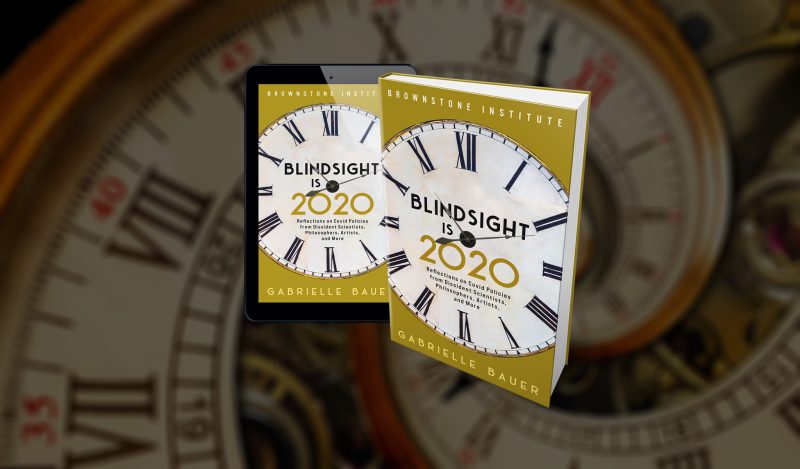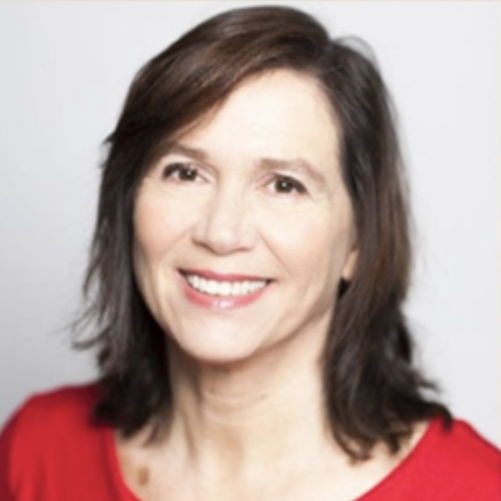Why would a 66-year-old woman object so strenuously to policies designed to keep her safe? My book Blindsight is 2020, just published by Brownstone Institute, takes on the question. The book grew out of my deep concerns about the pandemic lockdowns, mandates, and what I call Covid culture. I’m honored to share a few details about the book with the Brownstone community.
Remember the early days, when everyone was telling us to follow the science? Like many others, I had a problem with this slogan. From the day the lockdowns were announced, I wondered: Why are only scientists being consulted? Where are the mental health experts to tell us how social isolation will affect our most vulnerable, both young and old? Where are the economists to insist on a cost-benefit analysis? Where are the ethicists to weigh in on the appropriate balance between risk avoidance and human rights? Or the philosophers to zoom out to the big questions, like the perils of setting life apart from living?
These perspectives, so often missing in the Covid discourse, carry no less weight than the epidemiologic one. A young human-rights lawyer has important insights to impart about a pandemic, as does an aging philosopher. Or an author of groundbreaking fiction. I stumbled into these insights in magazine articles, academic papers, podcasts, and elsewhere, and felt it was important to gather them in one place.
That’s why the 46 dissenting thinkers showcased in the book include not just scientists and doctors, but philosophers, ethicists, economists, politicians, lawyers, writers, musicians, as well as a comedian and a priest. A book can only be so long, so I had no choice but to leave out many important figures—researchers and scholars who continue to work tirelessly against the excesses and blind spots of the Covid era. My selection simply reflects the focus of the book and the aim of presenting perspectives from various disciplines and political bents.
Beyond the science
The book takes the position—shared by many scientists, as it turns out—that a pandemic is not just a scientific problem, but a human one. “The novel coronavirus response is being driven too much by the epidemiology,” Mark Woolhouse states in his book The Year The World Went Mad. A professor of infectious disease epidemiology at the University of Edinburgh and one of the people I feature in the book, Woolhouse shares my dismay at the curious and conspicuous dismissal of the mental-health, human-rights, and economic perspectives on the pandemic. “We epidemiologists were repeatedly told it was someone else’s job” to worry about these things, he writes. But “whose? Nothing was ever made public.”
As a health and medical writer who works with doctors most days of the week, I have a deep respect for science. But science alone cannot dictate pandemic policy. The UK government, for one, understood this in the pre-Covid era. “Before Covid, [we] had a much broader view of pandemic management,” UK medical sociologist Robert Dingwall—another one of my featured 46—told me in an interview. “Our whole-government approach, which saw pandemics as a societal threat rather than a public health threat, was much admired in Europe.”
Managing a pandemic is not just about containing a virus, but about shepherding the human family through a massive societal upheaval. An upheaval that threatens not just lives, but livelihoods. Not just lung health, but mental health. Not just heartbeats, but hopes and dreams. It’s about striking a balance between collective action and individual agency. It’s about respecting that not everyone brings equal capabilities or resources to the navigation of public health directives—considerations that were jettisoned with Covid.
Epidemiologists can do epidemiology. Public health experts can do public health. But none of these experts can do society or human nature any better than intellectuals from other disciplines or even “ordinary people.” No scientist has the legal or moral authority to tell someone they can’t sit next to a parent on their deathbed.
Letting people die alone may align with the goal of viral containment, but that doesn’t mean it serves the “greater good,” whatever the term means. Yale University philosopher Samantha Godwin made this point in a 2021 Tweet: “We have collectively accepted, without meaningful debate, the ideological belief that the greater good can be equated with maximum COVID mitigation, without concern for or recognition of the collateral harms caused by these mitigation efforts.” I wrote the book to give pride of place to such insights, which the mainstream Covid narrative has summarily discounted.
Embracing reality
The dominant narrative positions the virus as the enemy in a planetary war—an enemy we must fight to the bitter end, costs be damned. The dissenting narrative views Covid as a guest that, while not exactly welcome, is here to stay, so we need to find a way to coexist with it without destroying our social fabric. In his book Gone Viral, Justin Hart calls the supporters of each narrative Team Apocalypse and Team Reality, respectively.
My book runs with the second narrative: we can mitigate risk, but not eliminate it, and sharing the planet with the coronavirus while retaining our humanity means accepting this fact.
“Reality can only be denied for so long before you run out of resources to keep up the charade,” says Heidi Buxton, the brilliant Colorado nurse who reviewed my manuscript before publication. “The world today is much closer to 2019 True Normal than it is to 2020 New Normal, and a lot of that is because what the Covidians wanted is both logistically and psychologically impossible.” In other words, pandemic policies must respect human nature—a point made by several people quoted in the book.
As an essayist and memoirist, I also enjoy weaving some storytelling into the mix. From attendance at a freedom rally and therapy with a Zoom shrink to a trip to Sweden and an LSD trip on a lake, I recount several personal experiences that sprang from my despair about the Covid policies.
No book should try to be all things. While I have much respect for the researchers who continue to investigate the origins of the virus, early treatments, and vaccine side effects, the focus of Blindsight Is 2020 lies elsewhere. Its diverse voices shine a light on the fears and follies that set the Covid era in motion, and suggest a saner path forward.
The book is available on Amazon as a printed edition or in e-reader format. Over the next little while, Brownstone plans to post some excerpts.
Join the conversation:


Published under a Creative Commons Attribution 4.0 International License
For reprints, please set the canonical link back to the original Brownstone Institute Article and Author.









